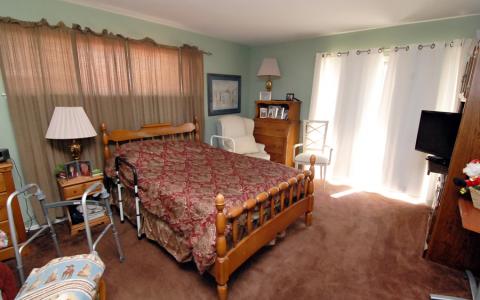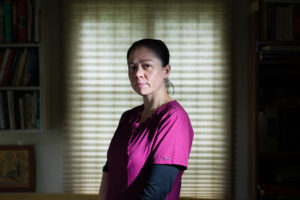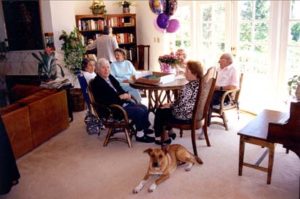
Room at a board-and-care home.
Credit: ezmedcloud.com
Board-and-care homes are facilities for elderly people that tend to be cheaper than the average nursing home. These lodgings are former privately owned residences that have been refurbished as care facilities. Oftentimes the staff at these board-and-care homes are comprised of immigrants working for as little as $2 to $3 an hour, according to an investigation by Reveal.
The in-depth investigation revealed that many board-and-care homes are extremely profitable, but caregivers employed at these homes do not share in that wealth. Many of the profitable homes depend on the exploitation of their workers. These facilities will usually promote 24-hour care to their prospective clients. This perk is possible because many of the caregivers in these homes live there as well. They’re on call 24 hours a day, sometimes seven days a week.
Reveal found that a substantial number of the workers are in the U.S. without authorization. Many are in the process of applying to remain in the country. And so they are paid less than they should be and are restricted in where they can work.
According to Reveal, board-and-care home operators across the country broke minimum-wage, overtime or record-keeping laws in roughly 1,400 cases over the past ten years. The investigation also found that at least 20 companies in California providing care for the elderly, disabled and mentally ill continue to operate illegally. These homes have ignored judgments for back wages and penalties adding up to over $1.4 million.
Hostile Work and Living Environments
Some of the stories from the Reveal investigation are quite horrendous. Caregivers at these board-and-care homes sometimes feel trapped. Many rise before the sun to cook meals, shower residents and scrub toilets. At night they have to administer painkillers, change residents’ diapers, turn bedridden patients to prevent bedsores and return wandering dementia patients back to their rooms.
Workers have shared stories about sleeping in hallways and garages or on couches or the floor. Yet, some board-and-care homes deduct $25 a day from workers’ paychecks for “lodging.” Days off are a rarity; when a worker does get time off, they sometimes have to pay out of their own pockets for their substitutes.

Julie Riduta suffered a miscarriage due to heavy
lifting while working at a board-and-care home
Credit: revealnews.org
Caregivers are afraid to report their mistreatment to authorities because of intimidation by their superiors. They’re harassed or fired if they report their horrible pay rates or unpaid overtime. Ninety of these care-home workers in California who spoke to Reveal said their bosses intimidated them, threatened to report them to immigration authorities or to blacklist them in the industry. According to prosecutors and attorneys, human trafficking in the industry is not uncommon.
“It’s a classic tale of human greed,” said Tia Koonse, legal and policy research manager at the UCLA Labor Center. “[The board-and-care homes’] entire business model is predicated on not making payroll. It relies on people being willing to work for 24 hours a day for less than a dollar an hour. Only trafficked people will put up with that.”
A Heartbreaking Story
The Reveal investigation also found two instances in which board-and-care-home workers suffered miscarriages as a direct result of workplace abuse. One was Julie Riduta, 45, of Concord, California.
She arrived here more than 10 years ago from the Philippines to work at a care home. She earned $2 an hour to work 24-hour days. She needed the money in order to educate her 8-year-old daughter, who was still in the Philippines. Riduta slept on a thin piece of foam on the floor next to residents, who would kick her awake when they needed help.
She found out in the summer of 2014 that she was pregnant. Soon after, she was plagued with morning sickness and was worried about lifting heavy residents. She asked for time off, but her request was denied.
“Go to the mirror and look at yourself,” Riduta recalled her boss saying. “Ask if you’re allowed to complain.”
She had a miscarriage two weeks later. The fetus was nine weeks old.
“I was crying all night,” Riduta said. “I still have this dream that there’s a baby crying all the time. They treated us like animals.”
Of course, this is one horrible story, and Riduta’s misfortune isn’t necessarily common. But it makes you wonder how many things like this have happened in the industry that no one has heard about.
Encouraged Behavior?
The idea of turning residential houses into board-and-care homes is gaining traction across the country. High profitability potential is driving the growth of the business model. Potential owners are even being encouraged to find ways around providing positive work environments for their employees.

Board-and-care homes are usually in former privately-owned residencies
Credit: astrowerks.com
According to the Reveal story, attendees at a daylong seminar for board-and-care home owners last October sought advice on pay and labor practices. They were advised to follow the law, but one presenter encouraged less-than-optimal behavior.
George Kutnerian is senior vice president of public policy and legislation for the 6Beds group. (6Beds Inc. is a lobbying and advocacy group for operators of small residential care facilities for seniors in California.) He advocated that operators can cut costs by using labor laws to their advantage.
The example he used was that homes don’t need to hire two caregivers if they can get away with one. “There is no staffing ratio,” he said. “A lot of people think, ‘I can’t have one caregiver alone.’ That’s not true…You gotta learn how to use one caregiver,” he said.
He went on to explain that if you employ only one caregiver, then they have to stay on the premises during their rest and meal breaks. If you have two, they can leave the place when on break. So the “trick,” as he called it, is being able to keep your worker on the premises when they’re on their breaks.
Going Forward
It seems that interest in board-and-care homes will continue to increase as more entrepreneurs learn about potential profitability. There were roughly 29,000 of these facilities nationwide and about 300,000 full-time caregivers in 2016, according to the most recent federal figures. Roughly two-thirds are smaller homes with four to 25 residents. Many of the residents have dementia.
It seems from the Reveal investigation that this industry has a serious worker-exploitation problem. Clearly, there needs to be more accountability and oversight. It’s a shame to think that the people tasked to care for our elderly and sick loved ones are treated so poorly. Imagine trying to treat so many people with love and kindness when you are subjected to such mistreatment. It’s not fair.
Hopefully, these workers will gain better protections going forward. But, of course, in this country, that’s unlikely to happen for immigrants trying to make new, better lives here for themselves and their families.

 The Exploitation Of Workers In Board-and-Care Homes
The Exploitation Of Workers In Board-and-Care Homes




 Composting Bodies Is Now Legal in a Dozen States
Composting Bodies Is Now Legal in a Dozen States














